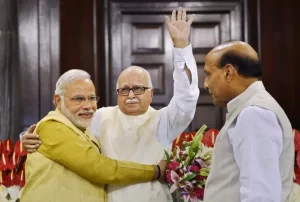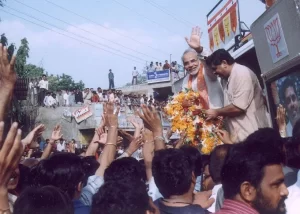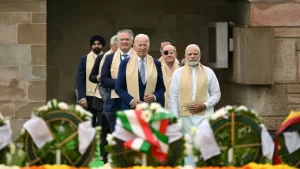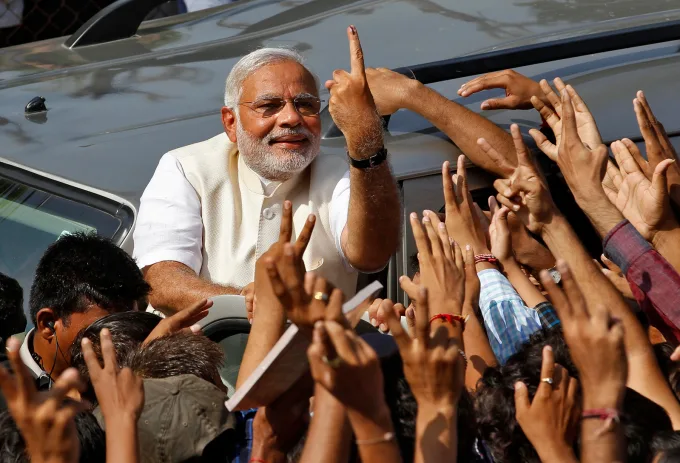Indian Prime Minister Narendra Modi once famously made a simple election promise: “good days are coming.” by seeking third term in office.
To his adoring supporters, it’s a vision of a future now finally within reach should Modi and his right-wing Hindu nationalist Bharatiya Janata Party (BJP) secure an emphatic and rare third consecutive term at this month’s nationwide election.
His supporters see him as ” a god ”
At his rallies, tens of thousands gather in near frenzied religious devotion in support of a man whose policies they say have transformed the lives of ordinary Indians – and helped enshrine the nascent promise of social mobility in a country still riven by caste divisions.
 Modi projects himself as an outsider from humble origins. Born as the son of a tea seller in a small town in Gujarat, he does not fit neatly within the often privately educated, resolutely metropolitan, English-speaking template set by many previous Indian leaders.
Modi projects himself as an outsider from humble origins. Born as the son of a tea seller in a small town in Gujarat, he does not fit neatly within the often privately educated, resolutely metropolitan, English-speaking template set by many previous Indian leaders.
The 73-year-old is single, has no children, and seemingly shuns expensive material possessions in favor of a simple, ascetic lifestyle.
And though little is shared about Modi the man – his private life is assiduously guarded by a formidable public relations team – his persona resonates with many.
Popular but polarizing: Hear what Indians say about Modi
His political rise in some ways mirrors India’s own path from a newly independent nation freed from the shackles of colonialism to a confident, secure country inching ever closer to superpower status – albeit one wracked by deep and abiding fault lines.
Modi, his opponents argue, has done little to soothe those divisions.
Religious persecution and Islamophobia have increased sharply on his watch, with many accusing the prime minister of tacitly endorsing sectarianism as a means of further bolstering his Hindu-nationalist credentials, while diverting from policy failures – such as youth unemployment, which now stands at close to 50% among 20- to 24-year-olds.
Among India’s minorities, particularly the country’s 230 million Muslims, the prospect of another five-years for a prime minister who calls himself the “chowkidar” – or watchman – remains deeply concerning.
Many don’t believe Modi is watching out for them – instead, they say they are marginalized as he fulfills his party’s dream of transforming secular, pluralistic India into a majoritarian Hindu state.
“As he goes toward seeking a third term, Prime Minister Modi has positioned himself as a head priest alongside the head of the political system … the protector of the nation (and), as the creator of a Hindu-first nation,” said Saba Naqvi, author of “The Saffron Storm: From Vajpayee to Modi.”
This seemingly potent, populist mix of economic empowerment and Hindu nationalism has proved to be a successful electoral formula for Modi, confounding longstanding social and regional voting lines.
According to 2023 Pew research, about eight-in-ten Indian adults have a favorable view of Modi, including 55% who have a very favorable view. Such levels of popularity for a two-term incumbent prime minister defy all modern conventions, both in India and throughout much of the democratic world.
“He’s done something which has not happened before in Indian politics among all our prime ministers,” said Naqvi. “He has willfully created a cult of his own personality.”
‘ Many people think he is God’
Many people think he is God’
As the sun sets across the Ganges, Hindu devotees bathe in the holy river’s waters and priests offer daily prayer by its banks. It’s here, in the city of Varanasi – Modi’s own constituency – that this so-called cult of personality is on full display.
Billboards with the prime minister’s face appear on the corners of roads, and saffron flags with his party’s lotus symbol are hoisted on buildings across the dusty, meandering gulleys of the ancient city.

On the streets, his party’s volunteers go door-to-door advocating for the leader.
When Modi first ran for prime minister a decade ago, he did so on a promise of infrastructure, development and anti-corruption, choosing the city of gods as his constituency – its religious symbolism the perfect backdrop for his BJP’s Hindu nationalist ambitions.
In one of Varanasi’s oldest spice markets, shopkeepers say their lives have been transformed since.
“Many people think he is God,” said father of two, Akash Jaiswal, pointing to Modi’s welfare schemes and business incentives. “We’ve never had a prime minister like Modi ever. He’s done a great sacrifice for India, for us … We want him to be prime minister forever.”
Jaiswal even praised some of Modi’s most controversial leadership moments. “India had the least casualties during Covid,” he said, when in fact the country had the third highest number of pandemic-related deaths, after the United States and Brazil, according to the World Health Organization. Modi was highly criticized for his handling of the pandemic and accused of being underprepared, as hospitals reached their limit and morgues overflowed with bodies.
The city’s BJP President, Dileep Patel, who has helped Modi with all three of his election campaigns, however, isn’t surprised by his enduring levels of popularity. To him, Modi represents India’s future.
“Today India is strong, capable, and self-reliant under the prime minister’s leadership,” he said.
India’s Prime Minister Narendra Modi speaking during a rally in Sydney, Australia, on May 23, 2023.
–CNN
Share your story or advertise with us: Whatsapp: +2347068606071 Email: info@newspotng.com














